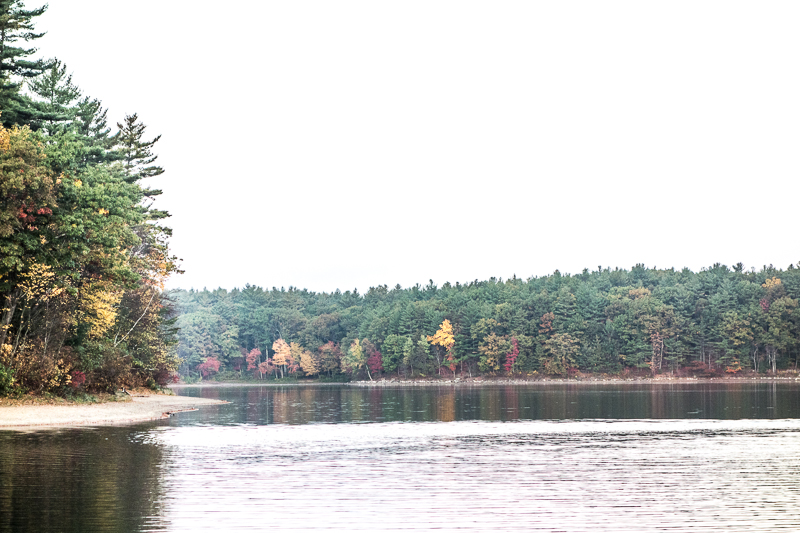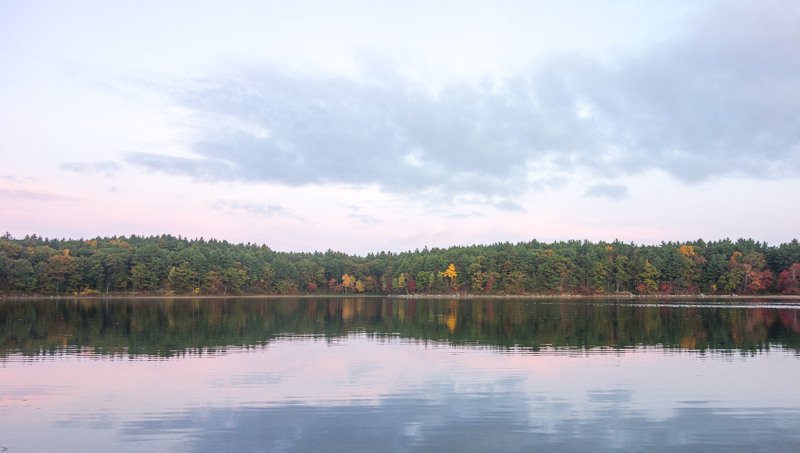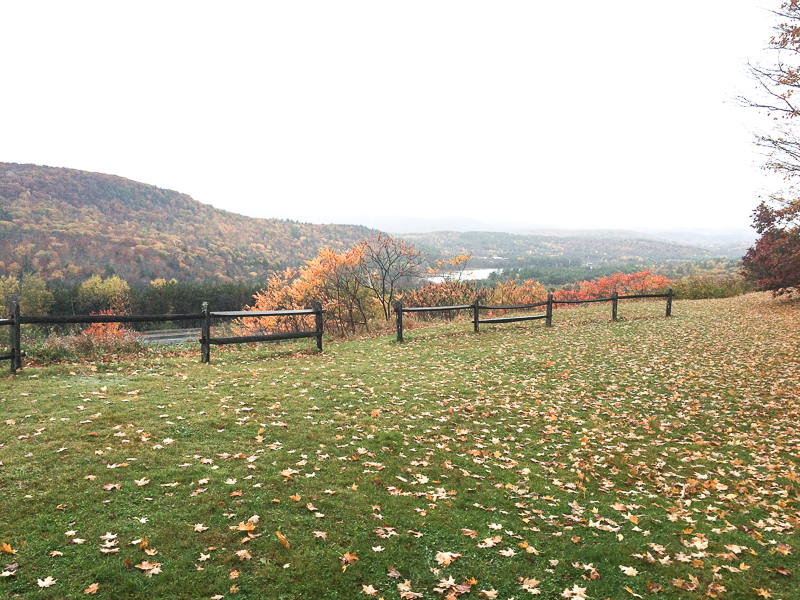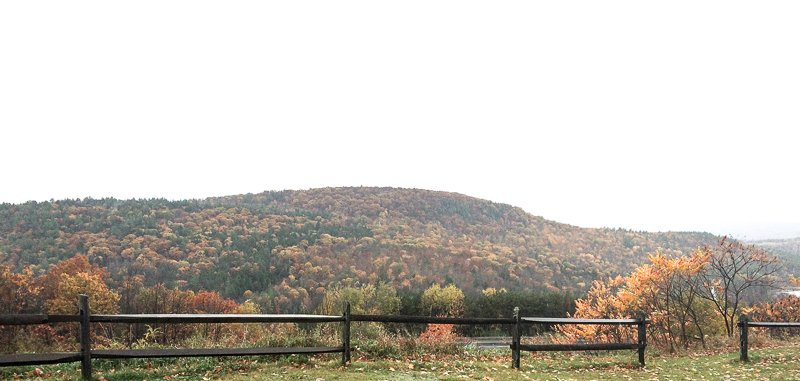The Backpacking Trip That Didn’t Happen
A while back I decided to visit Walden Pond. Not because it is wonderful wilderness and not because of Thoreau. I was going to be in Boston anyway, and Walden Pond and Thoreau are historical curiosities to me – nothing more and nothing less.
For the uninitiated, Walden Pond was the locale for the Transcendentalist Philosopher Henry David Thoreau’s experiment in self-reliance. The pond itself is not significant, but for me it ended up being quite pleasant and relaxing.
I didn’t know anything about Walden Pond itself, which is near Concord, Massachusetts. Didn’t know if there would be hiking or backpacking opportunities – though I suspected either would be limited.
PREPARATION
Most people, when going to a new place to hike, with no knowledge of the area would probably prepare by reading trail guides, checking maps, searching the Internet for trip reports, or visiting some online forum and asking what they should do.
Instead, I decided to re-read Thoreau’s tome, Walden on the plane to Boston.
Not long into Walden, I remembered how much I truly hate the Transcendentalist philosophers Thoreau and his mentor Ralph Waldo Emerson, not to mentioned the more painful German version: Kant. So I closed it and went back to reading Melville’s Moby Dick, which I started the week before.
I find that good novelists are more valuable than most philosophers anyway. They create the practical or impractical application of philosophy in their characters. Melville has more insight into man and living than Thoreau.
TRANSCENDENTALISM
The problem with the transcendentalist movement is it was both a religion and philosophy driven by the principle that knowledge is not gained by reason; but by the spirituality of the individual, and the transcendentalist will best achieve this by becoming self-reliant and communing with the Devine in nature.
And so Thoreau ends up at Walden Pond for his two plus year experiment of self-reliance. Right off the bat, he can’t afford his own land, so Emerson lets him build a house on his land. The “self-reliant” Thoreau walks to town (Concord) nearly every day, often dining with his mother and sometimes bringing his dirty laundry for her to wash. So much for self-reliance.
Emerson had hoped that Thoreau would become the nature writer who would spread the transcendentalist message of detachment from societal and political organizations, and to embrace the divinity of nature. Thoreau’s lack of ambition was a disappointment to Emerson and along with his untimely death at the age of 44; Emerson was left without the author he sought to spread his message about nature. Then along came John Muir, although not a philosopher, his alignment to the tenants of transcendentalism and his environmental activism was what Emerson had hoped Thoreau would have become. I like most of Muir’s writings, I just ignore his view of God and nature as a Devine entity.
PENCILS
Pencils, John Muir, and Thoreau.
How did this happen? Why do pencils keep appearing here? Last year I wrote a little satire in Which pencil for the John Muir Trail, and later the JMT pencil solution. This year after a hike in the Cedars of Lebanon, I shared John Muir’s connection to pencil making.
And now we have Thoreau who worked in his father’s pencil factory. Actually the younger Thoreau was quite talented. By developing a clay that was mixed with graphite, the Thoreau factory was finally able to produce pencils that rivaled the best from Europe. Thoreau also made improvements in the manufacturing equipment and processes.
MY TRIP TO WALDEN POND
Today Walden Pond isn’t much more than an urban park. I think it is officially a state park. Locating Walden Pond on my map, I headed out in my rental car. It was night, it was dark, and I had no plan other than drive to my destination and adapt. I figured there probably weren’t any real backpacking opportunities in the area and overnight camping, more than likely, isn’t allowed. But I had my backpacking kit with me anyway. Soon a a sign announced I was at Walden Pond. An entrance road to the pond was barricaded with a closed sign, pretty much what I had expected. The area is wooded, so I drove on. Finally found a little spur of a dirt road where I could park the car out of sight of the main road. Donning my headlight, I hiked for about 30 minutes in a light drizzle and found a suitable spot to setup my small shelter and spent the night as a stealth camper.
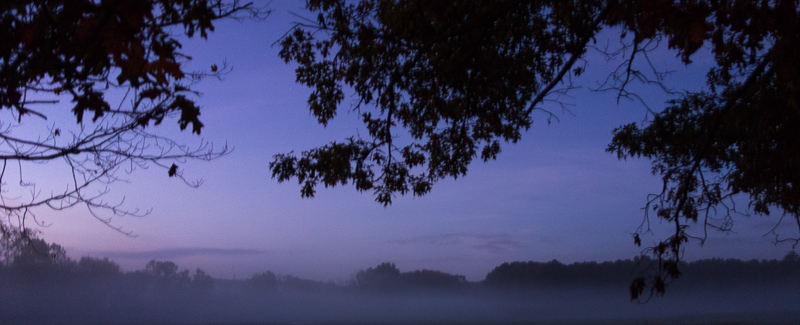 In the morning, I found I had camped in the edge of a meadow. Don’t know if it was natural or man-made, everything was hidden with a dark cloak of foggy weather. I packed up and hiked through the woods to the pond.
In the morning, I found I had camped in the edge of a meadow. Don’t know if it was natural or man-made, everything was hidden with a dark cloak of foggy weather. I packed up and hiked through the woods to the pond.
Walden Pond isn’t very big. Most people can easily walk it’s circumference in well under an hour. I spent a couple hours on the shore, watching the sun rise, burn off the fog and then bask in the warming morning. Sometimes you have to find a little piece of wilderness and simply enjoy it for what it is. Autumn was beginning to paint tree leaves shades of red, brown, and gold.
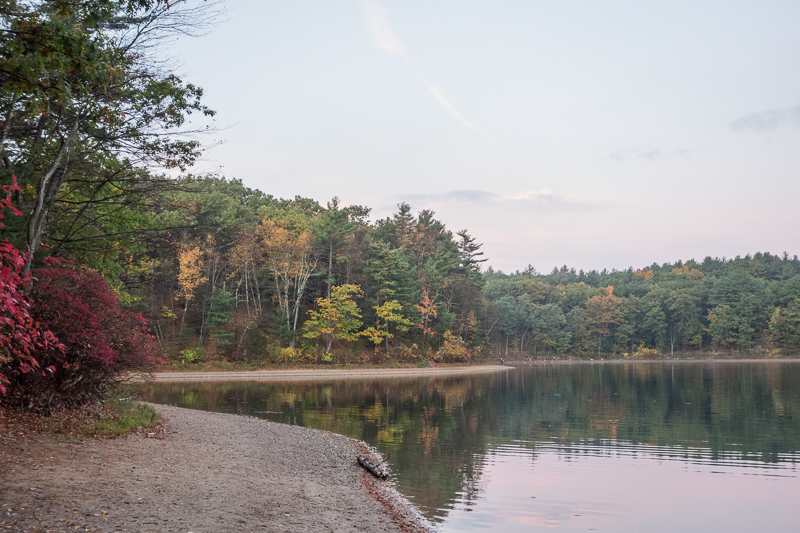
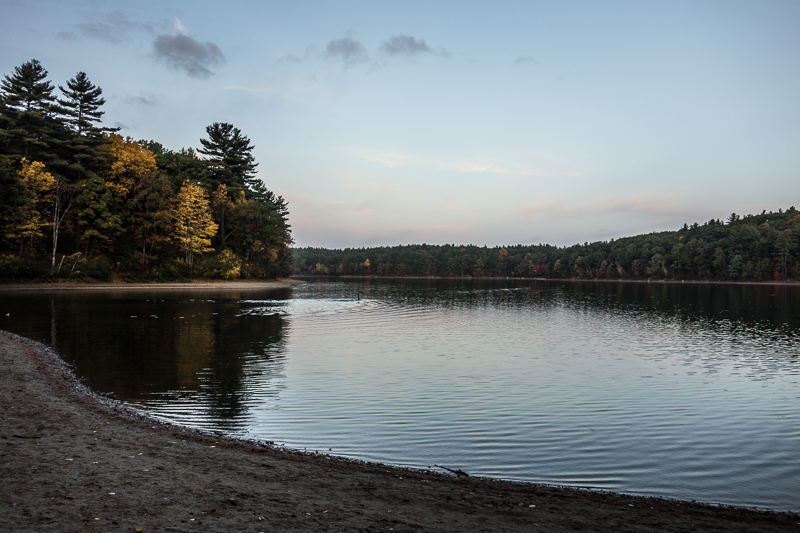
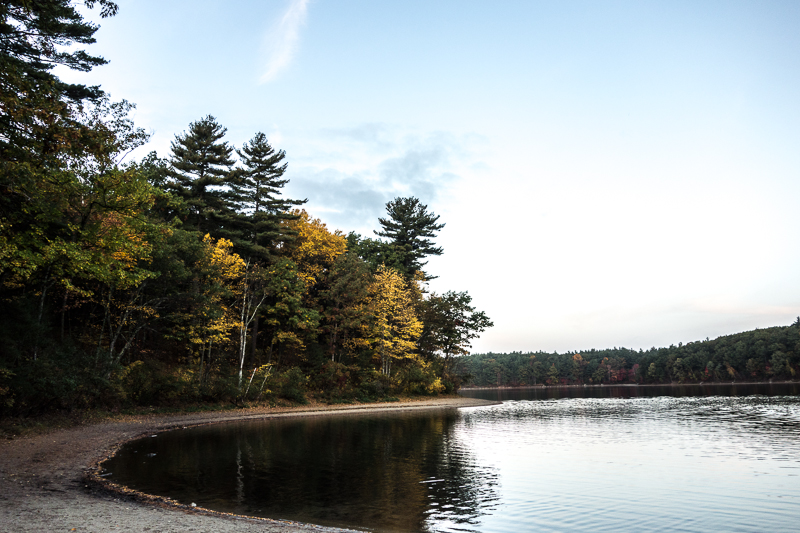 And what it is is the fact I was about an hour north of Boston in the 3rd most densely populated state in the country. A state with incredibly high taxes, inadequate and poorly maintained roads creating some of the worst traffic in the country.
And what it is is the fact I was about an hour north of Boston in the 3rd most densely populated state in the country. A state with incredibly high taxes, inadequate and poorly maintained roads creating some of the worst traffic in the country.
Houses, roads, highways, and railroad tracks hem in Walden Pond and the woods around it. Instead of an island in the center of its water, Walden Pond is an island in a growing man-made traffic jam of cars, houses, and shopping centers. Walking through the woods I came to a gas station. Outside I sat and watched bumper-to-bumper traffic while I ate a glazed doughnut and drank a cup of coffee purchased at the Dunkin Doughnuts, another island inside the gas station. There was nothing more for me here and nowhere to walk alone.
VERMONT
Since there was nothing for me at Walden Pond, I decided to head as far north as possible to see more autumn, that is more leaves of gold, brown, and red. Vermont seemed like a nice destination, but there would be little time for hiking as I needed to fly home the following morning. I headed north through New Hampshire and then across into Vermont. In spite of an all day drizzle, the cloud cover would occasionally break and show rivers, streams, hills and mountains. It was my first time in either state and I particularly enjoyed Vermont, probably because it has few people and lots of wilderness. I ended up Montpelier, the capital of Vermont, which happens to be the smallest capital in the US, with a population under 8,000 people. Had a great steak dinner at J Morgan’s steakhouse and drove back to the Boston area.
I will be going back to Vermont. The the Long Trail in this wonderful state will be a good place to start exploring.
2nd GREAT AWAKENING, SECTS, CULTS, AND MYSTICISM
Emerson’s transcendentalism wasn’t an isolated movement. The 19th century spawned many new religions, cults, philosophies and the like. This was mostly concentrated in New England and Pennsylvania. The “why” was a huge shift in American culture.
Starting with the influence of intellectuals prior to the 19th century such as John Locke and Thomas Jefferson we see the world quickly changing in the 19th century with the industrial revolution, the growth of capitalism, a populace with direct participation in the political process and better access to information. America was influenced by a growing number of intellectuals, authors and artists. The transcendentalists were one of many small groups.
